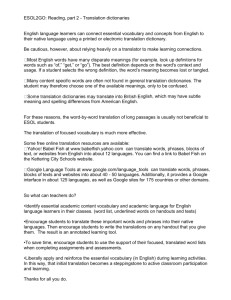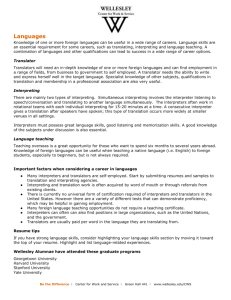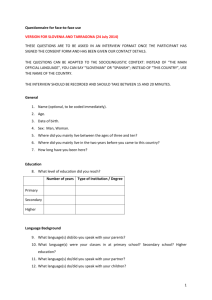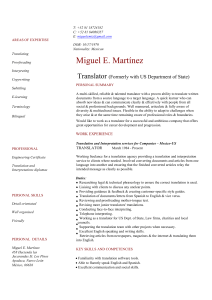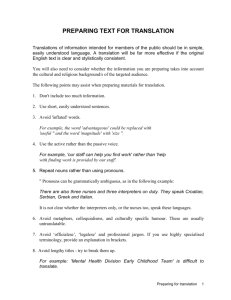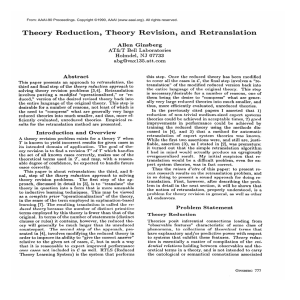ACROSS LANGUAGES AND CULTURES, Volume 7, Issue 2, 2006
advertisement
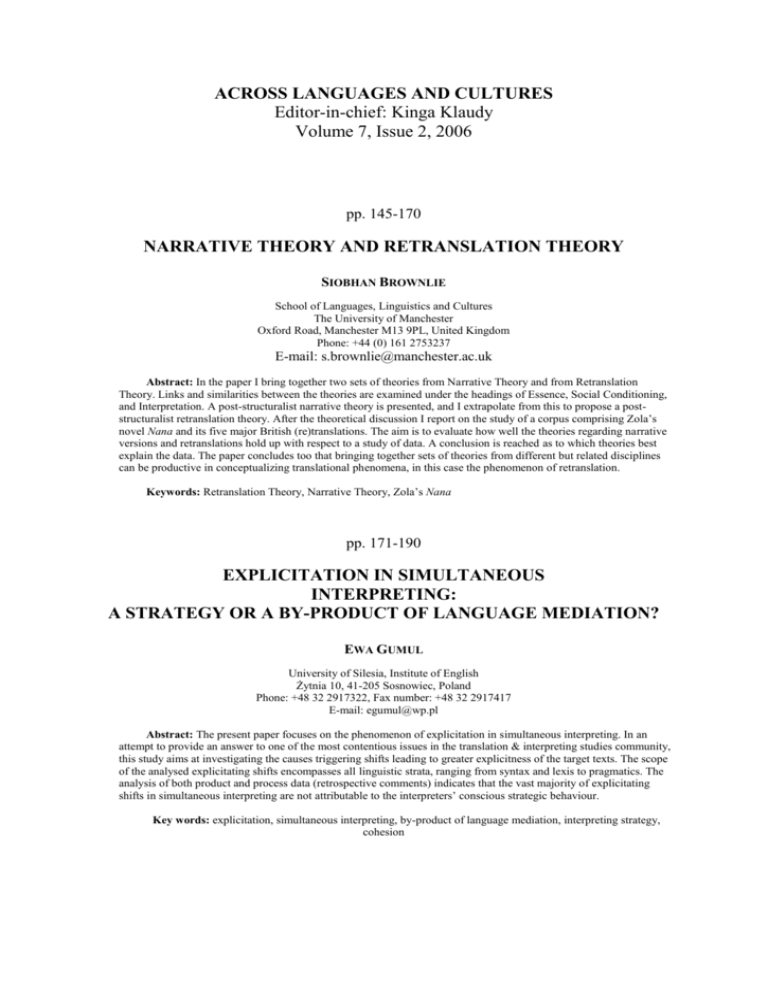
ACROSS LANGUAGES AND CULTURES Editor-in-chief: Kinga Klaudy Volume 7, Issue 2, 2006 pp. 145-170 NARRATIVE THEORY AND RETRANSLATION THEORY SIOBHAN BROWNLIE School of Languages, Linguistics and Cultures The University of Manchester Oxford Road, Manchester M13 9PL, United Kingdom Phone: +44 (0) 161 2753237 E-mail: s.brownlie@manchester.ac.uk Abstract: In the paper I bring together two sets of theories from Narrative Theory and from Retranslation Theory. Links and similarities between the theories are examined under the headings of Essence, Social Conditioning, and Interpretation. A post-structuralist narrative theory is presented, and I extrapolate from this to propose a poststructuralist retranslation theory. After the theoretical discussion I report on the study of a corpus comprising Zola’s novel Nana and its five major British (re)translations. The aim is to evaluate how well the theories regarding narrative versions and retranslations hold up with respect to a study of data. A conclusion is reached as to which theories best explain the data. The paper concludes too that bringing together sets of theories from different but related disciplines can be productive in conceptualizing translational phenomena, in this case the phenomenon of retranslation. Keywords: Retranslation Theory, Narrative Theory, Zola’s Nana pp. 171-190 EXPLICITATION IN SIMULTANEOUS INTERPRETING: A STRATEGY OR A BY-PRODUCT OF LANGUAGE MEDIATION? EWA GUMUL University of Silesia, Institute of English Żytnia 10, 41-205 Sosnowiec, Poland Phone: +48 32 2917322, Fax number: +48 32 2917417 E-mail: egumul@wp.pl Abstract: The present paper focuses on the phenomenon of explicitation in simultaneous interpreting. In an attempt to provide an answer to one of the most contentious issues in the translation & interpreting studies community, this study aims at investigating the causes triggering shifts leading to greater explicitness of the target texts. The scope of the analysed explicitating shifts encompasses all linguistic strata, ranging from syntax and lexis to pragmatics. The analysis of both product and process data (retrospective comments) indicates that the vast majority of explicitating shifts in simultaneous interpreting are not attributable to the interpreters’ conscious strategic behaviour. Key words: explicitation, simultaneous interpreting, by-product of language mediation, interpreting strategy, cohesion pp. 191-207 INTERPRETERS AND IDEOLOGY: FROM ‘BETWEEN’ TO ‘WITHIN’ FRANZ PÖCHHACKER Center for Translation Studies, University of Vienna Gymnasiumstr. 50, 1190 Vienna (Austria) Phone: +43 1 4277 58005, Fax: +43 1 4277 58008 E-mail: franz.poechhacker@univie.ac.at Abstract: Ideology was not an issue in the literature on interpreting until very recently. When the subject of ideology emerged in translation studies in the late 1990s, interpreting researchers were only just beginning to move beyond the traditional concern with (conference) interpreters’ psycholinguistic processing skills and cognitive functions to include problems of cross-cultural interaction in their purview. This exploratory paper therefore reviews the development of the interpreting profession from the conceptual vantage point of ‘ideology’, focusing on the common pejorative, political sense of the term. The positionality of interpreters as agents ‘between’ ideologies will be traced through the profession’s development before some examples will be given of how interpreters, their professional organizations and training institutions have become ‘involved’ in and with ideology, and to what extent such involvement has been acknowledged. As will be seen, closer examination of the relationship between interpreters and ideology is warranted even on a narrow, political understanding of the term, but especially if ideology is reconceptualized in the broader sense used in recent scholarship. Keywords: ideology, conference interpreting, impartiality, involvement pp. 209-226 LANGUAGE-RELATED STRATEGIES IN PREPARING ARBITRATION TIBOR VÁRADY Central European University Nádor u. 9, 1051 Budapest, Hungary Phone: (36) 1 327 3202, Fax: (36) 1 327 3198 E-mail: varadyt@ceu.hu Abstract: The present study deals with language issues and language related strategies in international commercial arbitration, focusing on the time period prior to the constitution of the arbitral tribunal. The issue of language becomes a part of party strategies, and it is also one of the questions which needs to be heeded in order to establish efficient arbitration. The first part of the study deals with choice made by the parties, strategic considerations behind such a choice, and consequences of a choice made. Consequences are scrutinized regarding both the parties and the arbitrators. Attention is also devoted to the interrelation between choice of language and choice of law. The second section deals with situations where the parties have failed to make a choice. In this situation the parties and the arbitrators have no firm guidance, but they may have some points of support on the grounds of which they may anticipate the language of the proceedings, and may prepare for the arbitration proceedings. The third part of the study deals with various facets of language issues emerging in court proceedings in assistance of starting arbitration. The question is raised whether the judges who are appointing arbitrators could and should verify the language abilities of the prospective arbitrators. Keywords: choice of language, choice of law, adaptation to a chosen language, adaptation to lack of choice, default language, linguistic aptitude of arbitrators. pp. 227-258 TRANSLATION IN CONTEXT OMNIBUS REVIEW ALBRECHT NEUBERT Nigel Armstrong: Translation, Linguistics, Culture: A French-English Handbook. TOPICS IN TRANSLATION 27. Series Editors: Susan Bassnett and Edwin Gentlzer Clevedon, Buffalo, Toronto: Multilingual Matters Ltd, 2005, 218 pp. ISBN 1-85359-4 [A] Lynne Long (ed.): Translation and Religion: Holy Untranslatable? TOPICS IN TRANSLATION 28. Series Editors: Susan Bassnett and Edwin Gentzler Clevedon, Buffalo, Toronto: Multilingual Matters Ltd, 2005, 209 pp. ISBN 1-8535-818-X [L] Phyllis Zatlin: Theatrical Translation and Film Adaptation: A Practitioner’s View. TOPICS IN TRANSLATION 29. Series Editors: Susan Bassnett and Edwin Gentzler Clevedon, Buffalo, Toronto: Multilingual Matters Ltd, 2005, 222 pp. ISBN 1-85359-832-6 [Z] Gunilla Anderman and Margaret Rogers (eds): In and Out of English: For Better or Worse? TRANSLATING EUROPE Series Editors: Gunilla Anderman and Margaret Rogers Clevedon, Buffalo, Toronto. Multilingual Matters Ltd, 2005, 303 pp. ISBN 1-85359-788-0 [A&R] Abstract: This is an omnibus review that deals with the almost simultaneous appearance of four books, each devoted to a significant aspect of translation studies. Each publication purports to contribute to what their authors hold to be essential business of the discipline, and this reviewer fully shares their views regarding the relevance of the questions raised in the four publications. In particular, he thinks that the individual approaches deserve to be seen in unison. This is the reason why the analysis of these four publications has been composed into a single review article, which is also intended to serve several other purposes: (1) to show that the studies, with the exception of the last title, represent integral voices of the now well-established series Topics in Translation, also published by Multilingual Matters, (2) to stress that all four books manage to put into the forefront what in a too narrow linguistic view often tends to get overlooked, namely the place of translation, past and present, in real life contexts. Keywords: translation and culture, translation of religious texts, theatrical translation and film adaptation, nonnative translators


